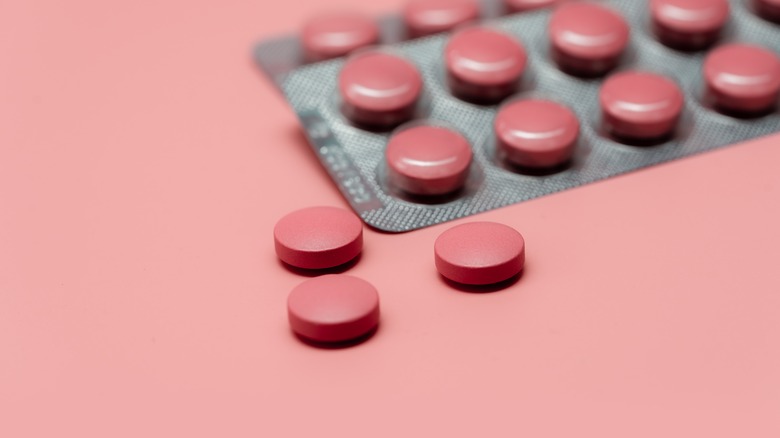Unexpected Signs You're Eating Way Too Much Peanut Butter (And Why They're Concerning)
Peanut butter is one of the most universally beloved foods, with Statista reporting that close to 300 million Americans consume it every year. Additionally, the National Peanut Board reports that approximately 94% of American homes have at least one jar of the stuff on hand at any given time. Part of its appeal lies in its versatility, with peanut butter serving as a key ingredient in both sweet and savory dishes, as well as being a good source of protein (via the American Peanut Council).
However, for all of its popularity, there can be too much of a good thing, as it turns out. Medical News Today notes that peanut butter is packed with calories, sodium, and saturated fats, for one thing. Its sodium content alone accounts for approximately 10% of an adult's recommended daily intake. And the amount of saturated fat present in peanut butter adds up to nearly a quarter of what adults should consume. On top of that, eating too much peanut butter can lead to a host of other health problems. Here are just a few issues you could face if you make peanut butter too much of a staple of your diet.
Hypertension
On one hand, peanuts and peanut butter can be a good option for a heart healthy snack or to help manage high blood pressure (via Summit Medical Clinic). Peanut butter is high in protein and healthy fats, which can be a good way to keep blood pressure under control. However, commercial brands of peanut butter can have added salts, sugars, and hydrogenated oils, which can lead to hypertension when consumed in excessive amounts (via Market.us Scoop).
Additionally, Market.us Scoop reports that certain brands of peanut butter contain something called palm oil. According to WebMD, palm is derived from the fruit of the African oil palm and is high in saturated fats. It's about 49% saturated fat, compared to less than half of that for olive oil. This high saturated fat content means that peanut butter brands that are made with palm oil could be linked to heart disease and other chronic health problems, such as hypertension.
Weight gain
According to WebMD, the nutrient density of peanut butter makes it a high-calorie food. That means that consuming too much of it at any given time can lead to you packing on unwanted pounds. In fact, the National Peanut Board reports that approximately one-fourth of the fat that your body needs each day are covered in just two tablespoons of peanut butter. Moreover, fat accounts for almost two-thirds of the caloric content of that serving size. And while much of the fat in peanut butter is from healthy, unsaturated fats, it's still important to be mindful of how much you are taking in each day.
Experts note that how you're eating peanut butter can be part of the problem (via Global News). If you're eating peanut butter by the spoonful right from the jar, chances are you're having too much. Instead of eating it from the jar while watching TV, be mindful of your serving size and spread out a spoonful or two over some toast. Knowing how much you're having, and being aware of your daily requirements, is a good way to make sure you're not having more peanut butter than you require or need.
Acid reflux and indigestion
The high fat content in peanut butter means that it could potentially trigger, or at least exacerbate, symptoms of acid reflux, indigestion, and gastroesophageal reflux disease or GERD (via Medical News Today). Peanut butters that are high in sodium or have added oils and sugars can be particularly problematic. In particular, those that are made with tropical oils (e.g., coconut oil), could cause symptoms more easily.
According to Tastylicious, part of the reason why peanut butter could be causing you to suffer from acid reflux is that the high fat, salt, and other additives present in certain brands could be triggering an inflammatory response. This doesn't mean that you need to completely cut peanut butter out of your diet. You may just have to trim it back a bit. If your symptoms persist, however, you may have to eliminate it. That said, if you have to have your fix, Cedars-Sinai Medical Center recommends that patients with acid reflux avoid chunky peanut butter, as that is more likely to trigger symptoms than creamy peanut butter.
Neurological disorders
Unbeknownst to most people, peanut butter actually contains a mycotoxin known as aflatoxin (via Scoop.market.us). These mycotoxins can have a serious impact on the body's neurological system. In high doses, it can lead to such conditions as attention deficit hyperactivity disorder, fatigue, and even Parkinson's or dementia. These latter cases are rare, though.
A 2022 study published in the International Journal of Food Science showed that of the brands of peanut butter produced in developing countries such as Zimbabwe, 80% of the raw peanut samples were contaminated with aflatoxin. Similarly, another 2022 study, this one published in Metabolites, studied 80 samples of peanut butter, hazlenut butter, and chocolate from markets in Turkey. The peanut butter samples all tested 100% for mycotoxins, and many of the samples tested had mycotoxin levels that exceeded the maximum value allowed by the Turkish Food Codex. While nearly all peanut butter brands contain aflatoxin, Mount Sinai says you can reduce your risk by avoiding eating unprocessed peanut butter and purchasing only well-known peanut butter brands which have been rigorously tested by the Food and Drug Administration.
Stomach pains
The high fat content in peanut butter can lead to indigestion due to bloating caused by excess fat in the upper gastrointestinal tract (via O2 Fitness). Additionally, you could experience stomach pain if you have a sensitivity to certain chemicals present in peanut butter known as salicylates and amines, according to the Food Intolerance Dietitian.
If you have salicylate and amine sensitivity, you can experience a wide array of symptoms, the Food Intolerance Dietitian reports. These include bloating, stomach pain, and diarrhea. It could also present with other symptoms such as foggy thoughts, rashes, and, in children, certain behavior issues. According to Medical News Today, there is no single diagnostic or blood test to confirm a sensitivity to these chemicals. If you suspect that you may be experiencing a reaction to salicylates, discuss it with your doctor. He or she may recommend eliminating certain foods from your diet, including beans, lentils, and peanuts, to see if the symptoms improve.
Acne
While peanut butter itself may not actually cause acne, the additives present, specifically sugar, could be a problem. The American Academy of Dermatology reports that consuming foods that are high in sugar will cause your blood sugar to spike. When that happens, the production of sebum, or oils produced by the skin, can increase, as can inflammation. When that happens, acne can be a possible outcome.
There is evidence to suggest that consuming a diet that is high in fat and sugar could be linked to acne breakouts. A 2020 study published in JAMA Dermatology showed that people whose diets were high in fat and sugar were 54% more likely to have problems with acne. In addition, there are other ingredients in peanut butter, such as omega-6 fatty acids and lectin, that could promote inflammation and lead to acne breakouts (via Face of Jules). In particular, lectin can lead to gut inflammation, weakening the lining of the intestine and resulting in acne problems.
Problems with blood thinners
Peanut butter is high in resveratrol, a plant compound that has antioxidant-like properties (via Healthline). This compound has been linked to a number of health benefits, including lowered cholesterol, improved brain function, and a reduction in blood pressure. It is commonly found in both the skins and the seeds of different grapes and berries, but is also present in peanuts and, by extension, peanut butter. According to Oregon State University, one cup of peanut butter contains 0.04 to 0.13 milligrams of resveratrol.
However, too much resveratrol in your diet could make blood clotting difficult (via Clean Cooking with Caitlin). Because of this, people who are taking blood thinners like Coumadin may experience problems such as nosebleeds, bruising, and abdominal pain. A 2018 study published in Biomedicines reported the hindrance of platelet aggregation due to resveratol, which indicated that bruising and bleeding risks were increased when resveratol was combined with anticoagulant and antiplatelet medications or non-steroidal anti-inflammatory drugs, commonly known as NSAIDs.
Difficulty absorbing minerals
Peanuts and peanut butter contain a substance known as phytic acid (via Sun Warrior). This substance binds itself to the nutrients in your food, which inhibits their absorption into your body. This means that foods with phytic acid are going to leave you somewhat malnourished and nutrient-deficient.
According to Harvard University, phytic acid will bind specifically to calcium, iron, and zinc, which will make absorbing these minerals into your intestine difficult. However, the lack of absorption tends to happen when phytic acid is consumed at the same time as these minerals. Healthline also notes that this deficiency tends to apply to a single meal, meaning that if you eat peanut butter during one meal, it may impact your nutrient absorption negatively for that meal, but you will not have similar issues when you eat again later on. However, people who follow poorly balanced diets or live in developing countries where grains and legumes are dietary staples may be more susceptible to nutrient deficiencies.
High cholesterol
For many years, peanut butter was made with partially hydrogenated oils, which included trans fats, according to the National Peanut Board. In 2015, the Food and Drug Administration deemed that trans fats were no longer safe for consumption, which resulted in most peanut butter brands removing partially hydrogenated oils from their products. According to the Mayo Clinic, trans fats are considered the worst kind of fats, and have the ability to elevate the levels of bad cholesterol in our bodies while reducing our good cholesterol.
However, the absence of trans fats in most peanut butter brands doesn't mean that there aren't other ingredients that could raise your cholesterol levels (via Cleveland Clinic). High calories and high salt content are cause for concern, as are the extra ingredients that many name-brand peanut butters include, such as hydrogenated oil and high fructose corn syrup. To keep your cholesterol in check, you should look for natural peanut butter brands that do not have added sugars, fats, salts, or preservatives.










